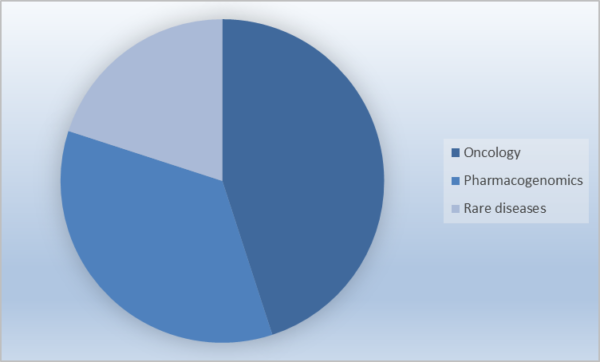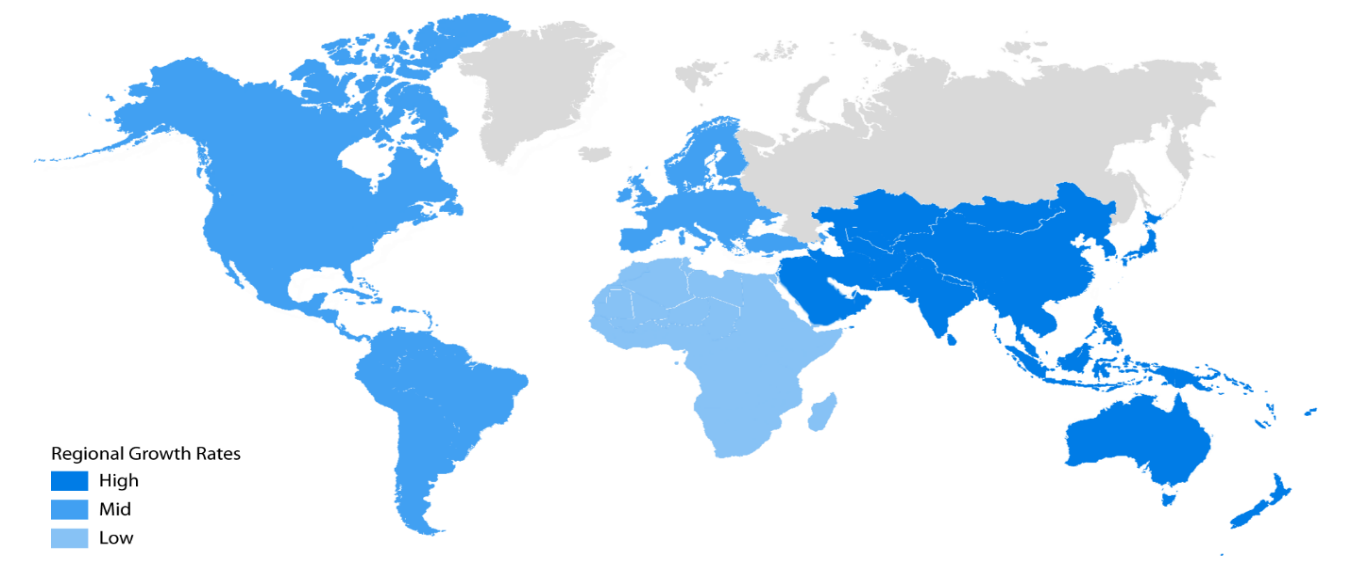Precision Medicine Software Market
Precision Medicine Software Market - Global Industry Share, Growth, Competitive Analysis and Forecast, 2019-2025 Update Available - Forecast 2025-2035
Precision medicine is defined as typical care in the treatment that is customized as per an individual patient. The rapid growth of genomics (microarrays, NGS, digital pathology and so on), metabolomics and proteomics data generated from clinical trials and research studies, coupled with the large amounts of patient data resulting from the digitization of healthcare, provide significant growth for global precision medicine software market. The market size is further expected to expand with the rising trend of precision medicine in cancer due to the increasing prevalence of cancer across the globe. The personalized medicine are used to treat a person by reducing the side effects via utilizing therapies and biomarkers for various forms of cancers such as ovarian cancer, breast cancer, lung cancer, prostate cancer, and oral cancer. Personalized medicine has the potential to modify therapy with the best response and highest safety margin to ensure better patient care. By enabling each patient to receive earlier diagnoses, risk assessment, and optimal treatments, personalized medicine holds promise for improving health care while lowering costs, expected to be a positive indicator for market growth. Moreover, the rising collaboration between software and pharmaceutical companies is another factor that propels the global precision medicine software market growth during the forecast period. However, the high deployment cost of precision medicine software is expected to hamper the market growth during the forecast period.
Segmental Outlook

The global precision medicine software market is segmented on the basis of application and end-user. Based on application, the global precision medicine software market is classified into oncology, pharmacogenomics, and rare diseases. Based on the end-user, the global precision medicine software market is segmented into pharmaceutical and biotechnology companies, hospital and clinics, research centers and government institutes. These end-users are significantly contributing to the growth of the market by utilizing the precision medicine software for different areas of applications such as oncology and others.
Oncology application segment to catalyze the global precision medicine software market
Among the application segment, the oncology segment is projected to have a significant market share in the global precision medicine software market during the forecast period. The market is mainly driven by the increasing prevalence of cancer across the globe and increasing investments by companies for cancer research. Biopharmaceutical companies nearly doubled their R&D investment in precision medicine over the past five years and expected to further increase their investment in the near future. Moreover, the estimates of disease susceptibility or disease prognosis can be improved by combining genomic test results with knowledge about various factors such as age, lifestyle, or tumor size. This is promising for predicting disease susceptibility, disease prognosis, or drug response of an individual patient. For device and drug manufacturers, the precision medicine provides an opportunity to develop agents that are targeted to patient groups that do not respond to medications as intended and for whom the conventional health systems have otherwise failed.
Global precision medicine software market to be mainly driven by hospital and clinics
The hospital and clinics segment is projected to have a significant market share in the global precision medicine software market during the forecast period. The market is mainly driven by the growing availability of the precision medicine software and increasing emphasis on providing precision medicine in hospitals and clinics. Precision medicine software is an essential tool for diagnosing infectious diseases, screening prenatal aneuploidy, evaluating rare diseases, and recognizing therapeutic targets in hospitals and clinics.
Regional Outlook
Moreover, the global precision medicine software market is classified on the basis of geography, including North America, Europe, Asia-Pacific, and Rest of the World. Europe and North America are estimated to contribute significant share in the global precision medicine software market. In these regions, the precision medicine software market is growing due to various factors such as the rising number of cancer patients, government initiatives, and increasing trend towards precision medicine in the healthcare industry. With the increase in the healthcare expenditure of several different countries in these regions such as the US, there has been an increase in the investments for R&D of different personalized medicines.
North America is Estimated to have Significant Market Share in Global Precision Medicine Software Market
On the basis of geography, North America is estimated to have significant market share in the global precision medicine software market during the forecast period. The is mainly due to the rising initiatives by the government for the use of precision medicine, coupled with the increasing digitization in the healthcare industry and rising cancer research funding in the region. High healthcare expenditure can have an important role in the development of cancer-based therapies and precision medicine products.
Market Players Outlook

The major players that contribute to the growth of the global precision medicine software market include 2bPrecise, LLC, Gene42 Inc., Intel Corp., IBM Corp., Koninklijke Philips N.V., LifeOmic Health, LLC, Pieriandx, Inc., Syapse, Inc., Tempus Labs, Translational Software Inc., NantHealth, Inc., and Genospace, LLC. These market players are contributing significantly in the market by adopting various market approaches including product launch and approvals, merger and acquisition, partnerships and collaborations, and others for gaining a strong position in the market. For instance, in May 2019, Syapse, Inc. and Amgen Inc. collaborated to enhance the precision medicine solutions in oncology. With this collaboration, the companies will develop observational research analytics to evaluate treatment consequences for ranges of unmet requirement in oncology.
The Report Covers
- Annualized market revenues ($ billion) for each market segment.
- Market value data analysis from 2018 to 2019 and forecast to 2025.
- Company share and market share data for global precision medicine software market.
- Global corporate-level profiles of key companies operating within the global precision medicine software market. Based on the availability of data for the category and country, information related to pipeline products, and relevant news is also available in the report.
- Analysis of market-entry and market expansion strategies.
- Competitive strategies by identifying ‘who-stands-where’ in the market.
- Investment strategies by identifying the key market segments that are expected to register strong growth in the near future.
- Analysis of key distribution channels and identifying the most preferred mode of product distribution.
1. Report Summary
1.1. Research Methods and Tools
1.2. Market Breakdown
1.2.1. By Segments
1.2.2. By Geography
1.2.3. By Stakeholders
2. Market Overview and Insights
2.1. Scope of the Report
2.2. Analyst Insight & Current Market Trends
2.2.1. Key Findings
2.2.2. Recommendations
2.2.3. Conclusion
2.3. Rules & Regulations
3. Competitive Landscape
3.1. Company Share Analysis
3.2. Key Strategy Analysis
3.3. Key Company Analysis
3.3.1. Overview
3.3.2. SWOT Analysis
3.3.3. Recent Developments
4. Market Determinants
4.1. Motivators
4.2. Restraints
4.3. Opportunities
5. Market Segmentation
5.1. Global Precision Medicine Software Market by Application
5.1.1. Oncology
5.1.2. Pharmacogenomics
5.1.3. Rare diseases
5.2. Global Precision Medicine Software Market by End-User
5.2.1. Pharmaceutical and Biotechnology Companies
5.2.2. Hospital and Clinics
5.2.3. Research Centers and Government Institutes
6. Regional Analysis
6.1. North America
6.1.1. United States
6.1.2. Canada
6.2. Europe
6.2.1. UK
6.2.2. Germany
6.2.3. Italy
6.2.4. Spain
6.2.5. France
6.2.6. Rest of Europe
6.3. Asia-Pacific
6.3.1. China
6.3.2. India
6.3.3. Japan
6.3.4. Rest of Asia-Pacific
6.4. Rest of the World
7. Company Profiles
7.1. 2bPrecise, LLC
7.2. Diaceutics Group
7.3. DNA Software Inc.
7.4. Fabric Genomics, Inc.
7.5. Foundation Medicine, Inc.
7.6. Gene42 Inc.
7.7. Genospace, LLC
7.8. Golden Helix, Inc.
7.9. Human Longevity, Inc.
7.10. Intel Corp.
7.11. IBM Corp.
7.12. Itransition Holding Ltd.
7.13. Koninklijke Philips N.V.
7.14. Labcyte Inc.
7.15. LifeOmic Health, LLC
7.16. MolecularMatch Inc.
7.17. NantHealth, Inc.
7.18. Qiagen N.V.
7.19. PierianDx, Inc.
7.20. SOPHiA GENETICS S.A.
7.21. Sunquest Information Systems, Inc.
7.22. Syapse, Inc.
7.23. Tempus Labs
7.24. Translational Software Inc.


